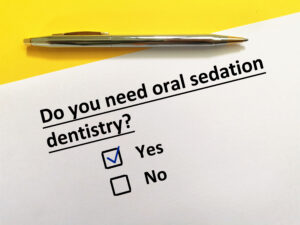
In recent blogs, we have been discussing the various types of oral surgery that you may need to undergo. These more invasive procedures, such as root canals, extractions, and wisdom teeth removals, may be worrisome for patients. To help ease your mind and increase your comfort, Riverside Dental Group in California offers oral conscious sedation for these treatments.
Can General Anesthesia Be Used In Dentistry?
Oral conscious sedation means that the patient is conscious during their treatment but will be in a relaxed state of mind and may not remember the surgery once it is done. On the contrary, general anesthesia requires a total loss of consciousness during a procedure. You will “go under” during the duration of your surgery. Both forms of anesthesia are monitored by a professional. When it comes to dentistry, conscious forms are used more often. They allow the patients to respond to the oral surgery team, when necessary, but also offer the benefit of feeling comfortable.
Types Of Oral Conscious Anesthesia
If you are undergoing a more invasive dental treatment or oral surgery, you may be given a form of oral conscious sedation. Tooth extractions, wisdom teeth removals, and root canal treatment may utilize a calming agent to help you feel at ease for your appointment. The type prescribed to you will depend on your health history, needs, and extensiveness of the procedure. Typically, oral conscious sedation is administered through a pill that is taken before coming in for the procedure. Other forms of relaxation may include nitrous oxide, also known as laughing gas, which may be used for patients who have anxiety about general dental work. After your procedure, you may be prescribed pain reducers. However, this is different from sedation.
After Your Treatment
The effects of anesthesia can vary for each patient, so it is important that a trusted friend or family member drives you to and from your appointment. It is normal to feel drowsy even a few hours after the procedure. If you are experiencing any abnormal side effects, call your dentist right away. Usually, a sedative is given if you are undergoing a form of oral surgery. Your dentist will give you specific aftercare instructions to care for yourself after these procedures.
Ask Your Dentist About Your Options
If you have a treatment coming up, ask your dentist about possible sedation options available to you. You can call your nearest Riverside Dental Group location at the following numbers:
Riverside Dental Group at Magnolia in Riverside, CA at (951) 689-5031.
Dental Associates of Moreno Valley in Moreno Valley, CA at (951) 697-6800.
Riverside Dental Group at Woodcrest in Riverside, CA at (951) 776-9001.
Oasis Family Dental in Temecula, CA at (951) 695-2290.
Dental Associates of Riverside in Riverside, CA at (951) 369-1001.
Dental Associates of Corona in Corona, CA at (951) 273-9580.











Recent Comments